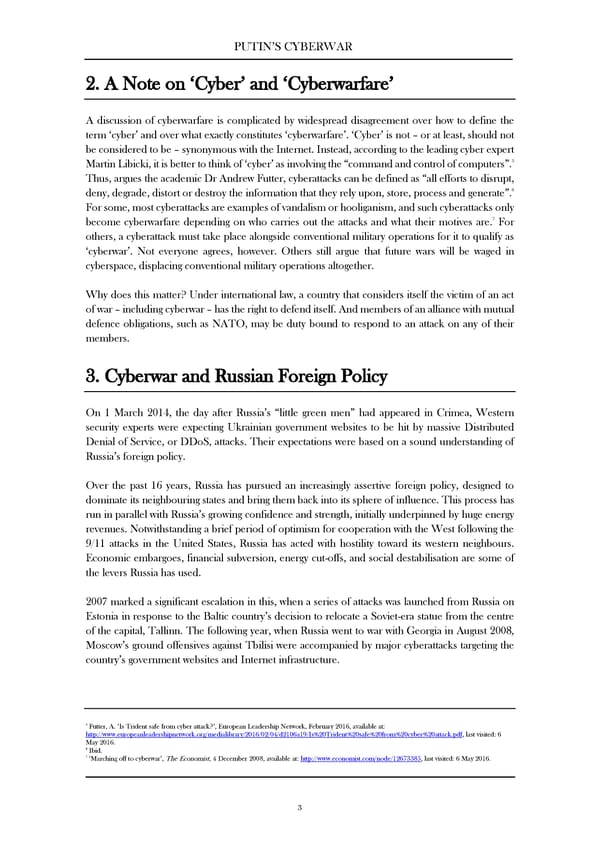PUTIN’S CYBERWAR 2. A Note on ‘Cyber’ and ‘Cyberwarfare’ A discussion of cyberwarfare is complicated by widespread disagreement over how to define the term ‘cyber’ and over what exactly constitutes ‘cyberwarfare’. ‘Cyber’ is not – or at least, should not be considered to be – synonymous with the Internet. Instead, according to the leading cyber expert 5 Martin Libicki, it is better to think of ‘cyber’ as involving the “command and control of computers”. Thus, argues the academic Dr Andrew Futter, cyberattacks can be defined as “all efforts to disrupt, 6 deny, degrade, distort or destroy the information that they rely upon, store, process and generate”. For some, most cyberattacks are examples of vandalism or hooliganism, and such cyberattacks only become cyberwarfare depending on who carries out the attacks and what their motives are.7 For others, a cyberattack must take place alongside conventional military operations for it to qualify as ‘cyberwar’. Not everyone agrees, however. Others still argue that future wars will be waged in cyberspace, displacing conventional military operations altogether. Why does this matter? Under international law, a country that considers itself the victim of an act of war – including cyberwar – has the right to defend itself. And members of an alliance with mutual defence obligations, such as NATO, may be duty bound to respond to an attack on any of their members. 3. Cyberwar and Russian Foreign Policy On 1 March 2014, the day after Russia’s “little green men” had appeared in Crimea, Western security experts were expecting Ukrainian government websites to be hit by massive Distributed Denial of Service, or DDoS, attacks. Their expectations were based on a sound understanding of Russia’s foreign policy. Over the past 16 years, Russia has pursued an increasingly assertive foreign policy, designed to dominate its neighbouring states and bring them back into its sphere of influence. This process has run in parallel with Russia’s growing confidence and strength, initially underpinned by huge energy revenues. Notwithstanding a brief period of optimism for cooperation with the West following the 9/11 attacks in the United States, Russia has acted with hostility toward its western neighbours. Economic embargoes, financial subversion, energy cut-offs, and social destabilisation are some of the levers Russia has used. 2007 marked a significant escalation in this, when a series of attacks was launched from Russia on Estonia in response to the Baltic country’s decision to relocate a Soviet-era statue from the centre of the capital, Tallinn. The following year, when Russia went to war with Georgia in August 2008, Moscow’s ground offensives against Tbilisi were accompanied by major cyberattacks targeting the country’s government websites and Internet infrastructure. 5 Futter, A. ‘Is Trident safe from cyber attack?’, European Leadership Network, February 2016, available at: http://www.europeanleadershipnetwork.org/medialibrary/2016/02/04/d2106a19/Is%20Trident%20safe%20from%20cyber%20attack.pdf, last visited: 6 May 2016. 6 Ibid. 7 ‘Marching off to cyberwar’, The Economist, 4 December 2008, available at: http://www.economist.com/node/12673385, last visited: 6 May 2016. 3
 Putin's Cyberwar Page 5 Page 7
Putin's Cyberwar Page 5 Page 7